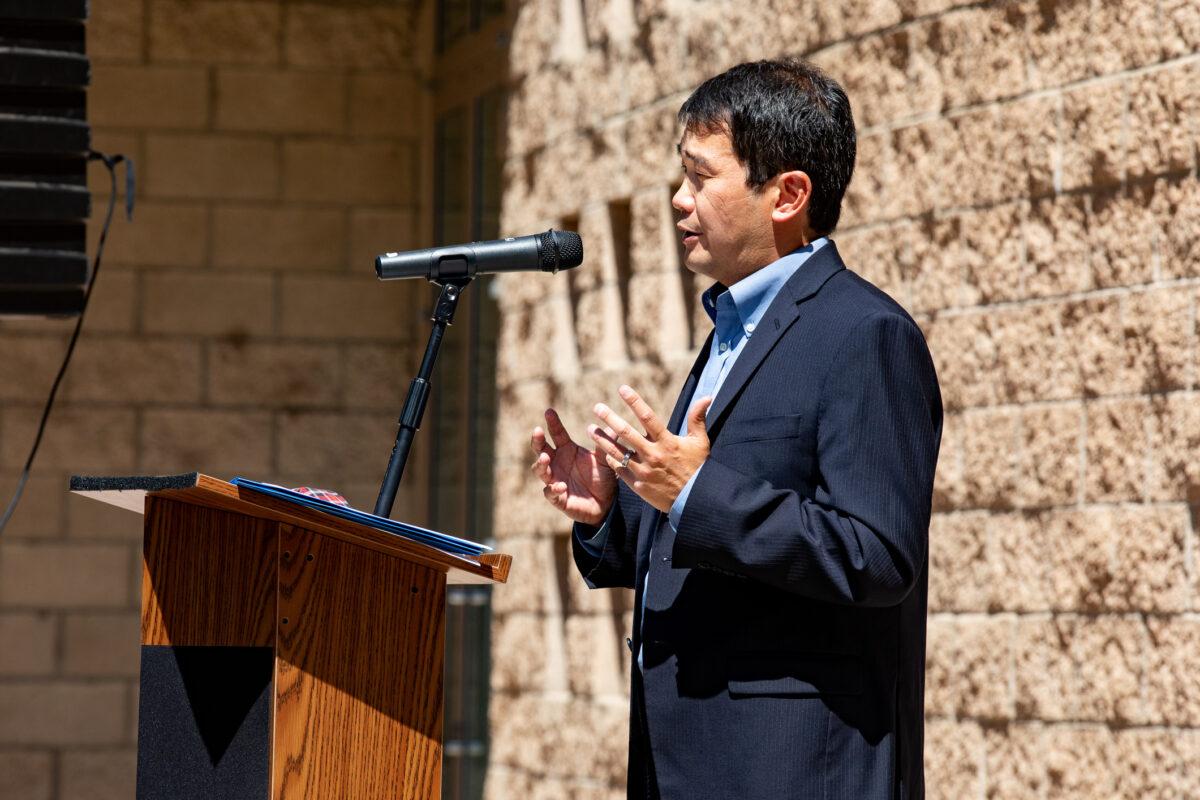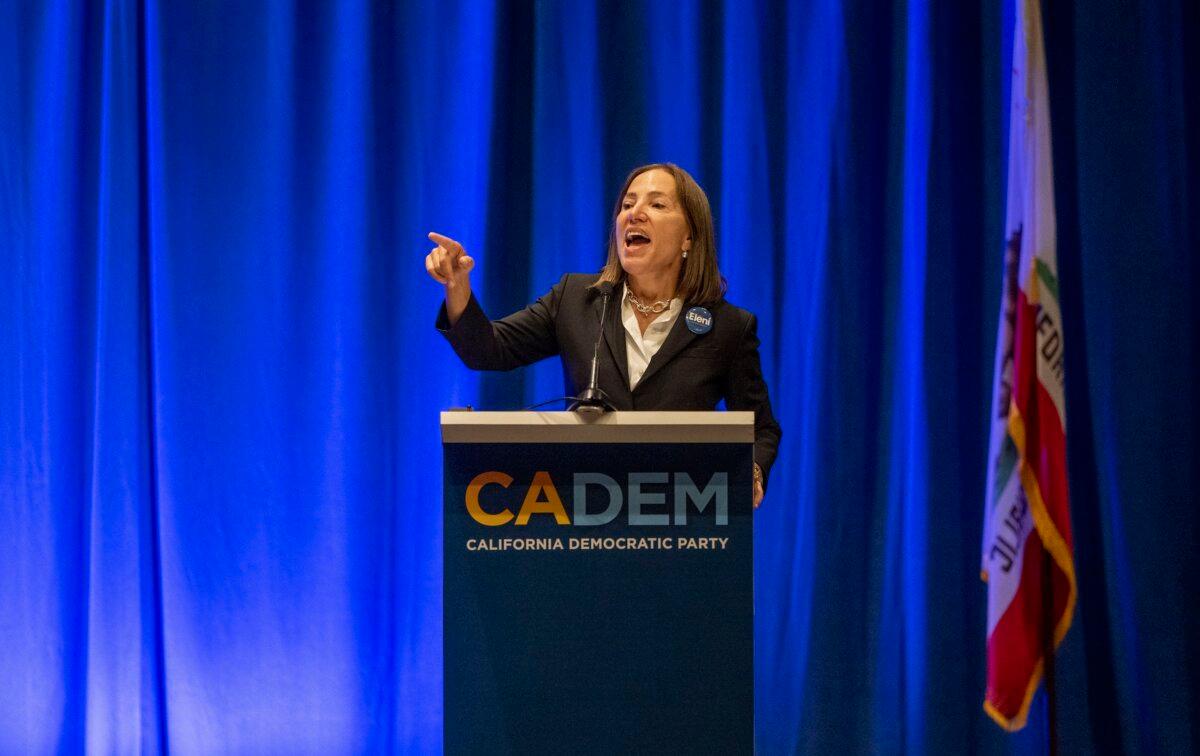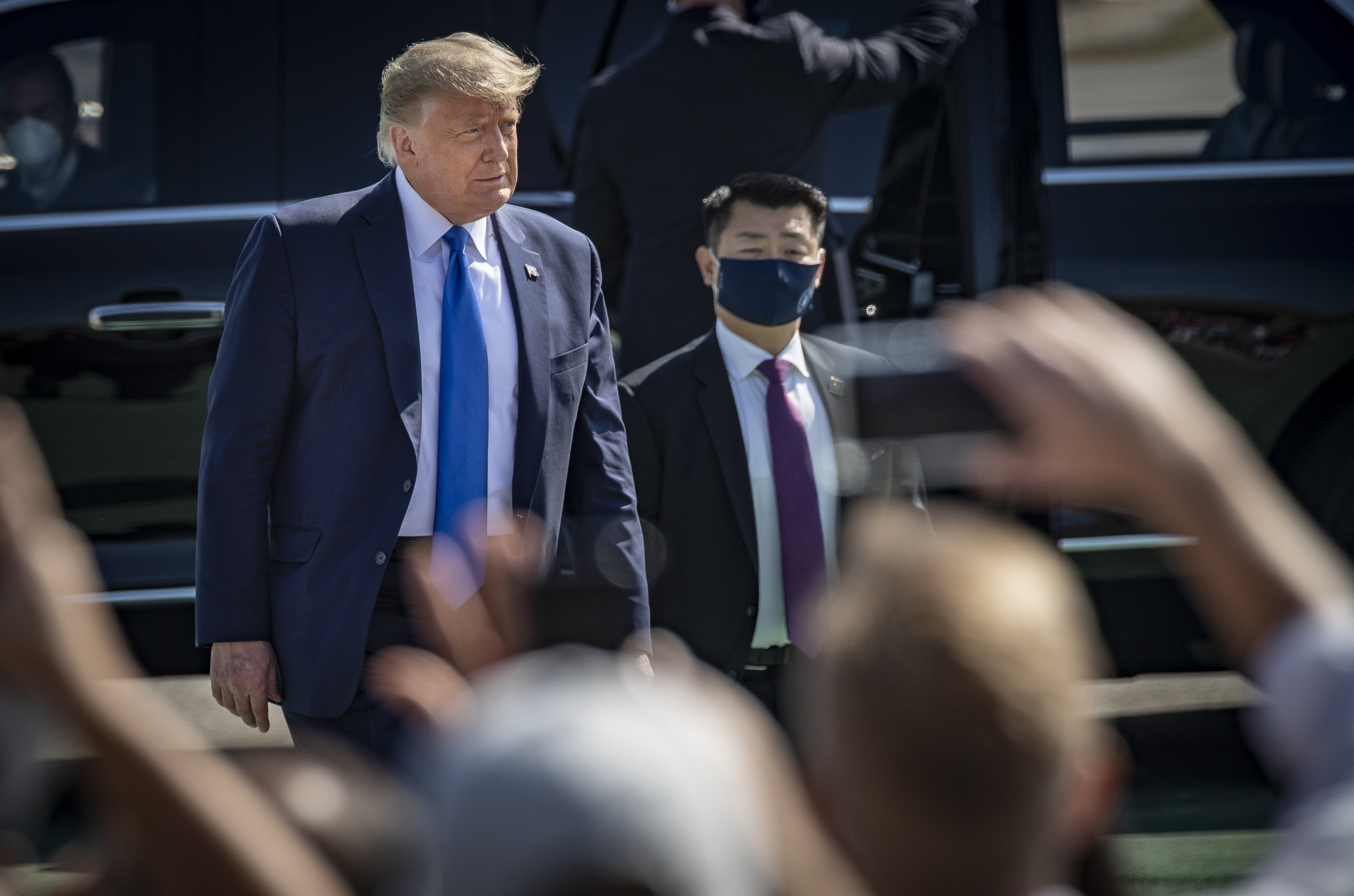Commentary
I suspect the U.S. Supreme Court is going to throw out the Colorado Supreme Court’s ruling that President Trump is ineligible to be on its March 5 Republican primary ballot, allegedly because he led an “insurrection.” Even the Washington Post editorialized against it in, “Should courts throw Trump off the ballot? Not so fast.”
Yet now we have California Democrats trying to do the same thing here. State Sen. Dave Min (D-Irvine), who is running for the U.S. Congress, announced Dec. 20 on Instagram: “I’ll be introducing a bill next year allowing CA residents to sue to remove ineligible candidates from the ballot, so I know a little something about the Colorado Supreme Court’s decision determining that Trump is ineligible to be President. My thoughts here, including why this decision could have impacts far beyond CO.”
To which someone named Travel Tracy replied: “So you are a freaking Communist who doesn’t support the constitution—and you wonder why people LEAVE CALIFORNIA.”
Mr. Min expanded his reasons on Twitter/X: “So I feel like a lot of the media coverage is missing the importance of the CO decision on Trump’s ballot eligibility.
“The CO decision isn’t based on state law, but rather on the US Constitution (specifically the 14th Amendment’s Section 3).
“What CO’s Supreme Court determined is that Trump is ineligible to be President under the 14th Amendment, because he had sworn an oath to uphold the US Constitution and then violated that oath by committing insurrection and rebellion.
“The removal of Donald Trump from Colorado’s presidential ballot isn’t the crux of that decision, but rather a byproduct of it. As others have pointed out, this isn’t really that different from if someone under 35 or born as a citizen of another country ran for POTUS.
“So if the US Supreme Court takes up the case and rules on it, it’s likely that that holding would have impacts not only for Colorado or other states that choose to remove Trump from the ballot, but potentially on the broader question of whether Trump can be POTUS.
“So yes, this is YUGE.”
“YUGE,” or huge, is how people mock Mr. Trump’s Queens, New York City accent.

Senator Dave Min speaks at an event in Tustin, Calif., on Aug. 27, 2021. (John Fredricks/The Epoch Times)
Justice Samour’s Dissent Refutes Min
Apparently Mr. Min, a graduate of Harvard Law School and a law professor at the University of California–Irvine Law School, didn’t read the dissent by Colorado Justice Carlos Samour, a Democrat like others on the court. The very anti-Trump Washington Post did read Mr. Samour’s words and wrote in its editorial:
“As Justice Samour points out in his dissent, however, what’s missing from the majority’s analysis is due process of law. Not only has Mr. Trump not been convicted of insurrection either by a jury of his peers or from the bench by a judge; he hasn’t even been charged with it. Tellingly, Justice Department special counsel Jack Smith has brought an aggressive case against the former president for conspiracy to defraud the United States, obstruction of an official proceeding and more—but not for violating the federal law against insurrection. The penalties for that, by the way, include disqualification from ‘any office under the United States.’
“Of course, in the United States, not just anyone can be president. Only aspirants over age 35 who are natural-born citizens may occupy the Oval Office. The difference is that these criteria are objective. Whether someone has engaged in insurrection is less so. Disqualifying a candidate based on an accusation, albeit one blessed by a state court judge as in the Colorado case—but not an actual conviction—is dangerous. What’s to stop a Republican politician from seeking to bar his Democratic opponent because the opponent attended Black Lives Matter protests, claiming that those protests, some of them nominally in service of abolishing the police, qualify as insurrection?”
Harvard Strikes Again
Mr. Min was brought out to UCI Law by the school’s former dean and founder Erwin Chemerinsky, currently dean of UC Berkeley’s Law School, a friend of Attorney General Merrick Garland from their own Harvard Law days in the 1970s. I wrote about this in my Epoch Times
article, “Berkeley Law Dean ‘Stunned’ by Students Radicalized at Schools Like Berkeley.”
The recent congressional testimony by Harvard President Claudine Gay equivocating about anti-Semitism on campus, along with similar testimonies by the presidents of MIT and the University of Pennsylvania, has brought new scrutiny to Ivy League radicalism. As a result, reported Reuters, “Law firm Edelson boycotts Harvard recruiting events amid antisemitism controversy.”
The fact is Americans are tired of the radical legal activism long promoted by Harvard Law and such graduates as Mr. Garland, Mr. Chemerinsky, and Mr. Min. Most outrageously, Mr. Garland has launched two of the four absurd criminal cases against former President Trump, also trying to keep him off ballots next Nov. 5.
Of the four Colorado justices in the court majority against Mr. Trump, Melissa Hart is a graduate of Harvard and Harvard Law. Two others are Ivy Leaguers, Richard L. Gabriel from Yale undergrad and University of Pennsylvania Law; and Monica Marquez from Yale Law. Only William Hood came from outside the Ivy League, graduating from the University of Virginia Law School.

California Lt. Gov. Eleni Kounalakis speaks to the Labor Caucus at the California Democratic Party state endorsing convention, in Sacramento, Calif., on Nov. 17, 2023. (Lezlie Sterling/The Sacramento Bee via AP)
Lt. Gov. Kounalakis Piles On
A graduate from radical Berkeley also is joining the piling on against Republicans’ right to pick their own candidate for president. Lt. Gov. Eleni Kounalakis, who is
running for governor in 2026, has an MBA from Berkeley.
On Dec. 20 her official state website posted this: “SACRAMENTO—Today, Lieutenant Governor Eleni Kounalakis sent a letter to California Secretary of State, Dr. Shirley Weber, urging her to explore legal options to remove former President Donald Trump from California’s 2024 presidential primary ballot following the Colorado Supreme Court’s ruling in Anderson v. Griswold (2023 CO 63). The Colorado Supreme Court held that Trump’s role in inciting the January 6, 2021, insurrection disqualifies him from standing for presidential election under section three of the Fourteenth Amendment.”
A copy of the press release was included, which included these words: “California must stand on the right side of history,” a phrase used by groups such as the Chinese Communist Party, which calls itself a “Marxist party.”
“California is obligated to determine if Trump is ineligible for the California ballot for the same reasons described in Anderson. The Colorado decision can be the basis for a similar decision here in our state. The constitution is clear: you must be 35 years old and not be an insurrectionist,” continued the press release.
No Insurrection
But as the Post pointed out, citing Mr. Samour, Trump hasn’t even been charged with “insurrection,” let alone convicted of it. There’s also the
argument by former Attorney General Mike Mukasey in the Wall Street Journal: “Was Trump ‘an Officer of the United States’? A careful look at the 14th Amendment’s Insurrection Clause shows that it doesn’t apply to him.”
He reasoned: “The latter question is easier. The use of the term ‘officer of the United States’ in other constitutional provisions shows that it refers only to appointed officials, not to elected ones. In U.S. v. Mouat (1888), the Supreme Court ruled that ‘unless a person in the service of the government ... holds his place by virtue of an appointment ... he is not, strictly speaking, an officer of the United States.’ Chief Justice John Roberts reiterated the point in Free Enterprise Fund v. Public Company Accounting Oversight Board (2010): ‘The people do not vote for the “Officers of the United States.”’
“Article VI of the Constitution provides that senators and representatives ‘and all executive and judicial Officers ... of the United States’ take an oath to support the Constitution. But the presidential oath is separately provided for at the end of Article II, Section 1, which would be superfluous if the president’s oath were required by the general language in Article VI. Mr. Trump took an oath as president pursuant to Article II, not as an officer pursuant to Article VI. Because the Insurrection Clause applies only to those who have taken an oath ‘as an officer of the United States,’ he can’t be barred by that clause from serving in any capacity.”
Conclusion: Another California Absurdity
Colorado used to be a conservative state. But so many Californians moved there, they yanked the Rock Mountain State to the left. That’s why it’s now dominated by leftist governors like the current one, Jared Polis, who appoint leftist justices. Albeit three of the seven justices still retained enough sense to object to the absurd ruling on Mr. Trump’s candidacy.
Yet despite the exodus from the Golden State in recent years, enough leftists remain here, and in power, that the rest of us have to put up with them.
That’s why I think this latest California hallucination will be made moot by the U.S. Supreme Court ruling against the Coloradoans to prevent national electoral chaos.
(Full Disclosure: When state Sen. John Moorlach lost to Mr. Min in 2020, I was Mr. Moorlach’s press secretary and helped with and contributed to his campaign.)
















